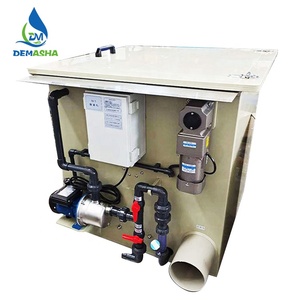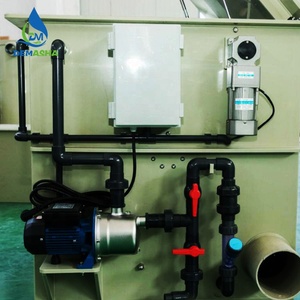(1019 products available)































































































































































































































Mini drum filters are available in different types to meet a wide range of needs and preferences. Each type has a unique function and importance in the operation of aquaculture systems and water treatment.
Gravity drum filters
Gravity filters work when waste water flows through an inclined cylinder, covered with filter media. The force of gravity causes debris to be trapped by the filter media, and then clean water flows out of the filter.
Pressure drum filters
Pressure mini drum filters use pressurized water to pass through the filter media and remove solid wastes. The filters are sealed and hold solid wastes until emptied through back flushing. Compared to gravity filters, pressure filters occupy smaller spaces and have greater filtration abilities.
Drum screen filters
Drum screen filters have rotating mesh filter screens housed in a drum-shaped container. Waste water flows through the rotating screens which capture solid waste. Then, the screens wash off the captured solids into a collection basin. The washing process makes drum screen filters to have uninterrupted filtration.
Sieve filters
Mini sieve filters use a fine mesh to capture solid particles from waste water. The filters can work with gravity or pressurized water. They have compact sizes but provide precise filtration for protecting equipment and enhancing water quality.
Static filters
Static filters have filter media that do not move. Waste water flows into the stationary filter media and solid waste is captured. While static filters have simple constructions and low costs, they require regular manual cleaning and maintenance.
Material:
Mini drum filters are typically manufactured using sturdy, corrosion-resistant materials, such as polyvinyl chloride (PVC) or stainless steel. PVC offers durability and lightweight performance, while stainless steel provides robustness and resistance to high temperatures.
Drum Diameter and Length:
The dimensions of the filter drum can differ according to applications. Commonly, the diameter ranges from 200mm to 1,000mm, while the length ranges from 500mm to 2,000mm.
Aperture Size:
The aperture size of the mini drum filter affects its filtration precision and efficiency. It usually ranges from 30 to 80 mesh. Smaller aperture sizes can filter more minute impurities but may result in a lower filtering speed, and vice versa.
Regular Cleaning:
Clean the filter drum at regular intervals according to the operating environment and water quality. Use a brush or high-pressure water pipe to clean the surface of the drum filter and pipeline attachments to avoid clogging and bacteria growth.
Check for Damage:
Inspect the filter's cylinder periodically to see whether it has any damages, such as cracks or deformation. Replace or repair the damaged components promptly to ensure the filtering quality and equipment stability.
Check the Pump:
Inspect the performance of the pumping apparatus regularly. Examine whether the connections are leak-tight, the operations are steady, and the filtering volumes are up to the expectations. Timely replace or fix the defective parts to ensure the effective and stable functioning of the whole filtering system.
Disinfection:
Carry out disinfection to the filter equipment periodically. Use appropriate disinfecting agents to clean the surface of the drum and the inner parts so that it can inhibit the growth of bacteria and algae, ensuring the wholesome water supply.
Mini drum filters can purify water in aquaculture farms. Using these filters fosters the sustainability of marine life. They achieve this by removing solid waste before clean water circulates again in ponds and tanks. Recycling water reduces the operational cost of running the fish farming business.
Wastewater treatment facilities utilize mini drum filters to remove moisture from solid sludge. The drying process enables easy transportation and storage of the sludge. Mini filters also separate clean effluent that can be recycled in the treatment facility or released to nearby water bodies without causing pollution.
Industries that use cooling towers install mini drum filters to improve the quality of water used. The filters get rid of waterborne pathogens that could promote the growth of Legionella bacteria. They also remove particulate matter and microorganisms. Improving the quality of water used in cooling towers lowers the risk of system breakdowns and enhances efficiency.
Mini drum filters are valuable components in mechanical systems supporting hydroponic and aquaponic farming. They remove solid particles from water. By doing so, they protect water pumps, nutrient delivery systems, and grow media from clogs and contamination. Besides extending the life of farm equipment, mini drum filters create healthier systems for plant and fish growth.
Aquarium owners use mini drum filters to keep aquariums clean. They remove waste produced by fish and uneaten food to maintain water quality. Proper water quality reduces the risk of diseases that could threaten the life of aquarium pets.
The construction industry uses mini drum filters to separate and collect slurry during excavation processes. The filter collects soil while allowing water to flow through. It minimizes the impact of dewatering on the surrounding environment and prevents pollution. Keeping contaminants on construction sites protects nearby water bodies.
Landscape and golf course maintenance teams use mini drum filters in irrigation systems. The filters remove clogging materials such as sediments and algae. They allow the water distribution system to function optimally and maintain the quality of green spaces and lawns.
Industrial machining applications can use the mini drum filter to remove metal shavings from the coolant used during machining processes. Separating the shavings from the coolant can lower the cost of disposing of the shavings and recycling the coolant.
Both the design and the function of the mini drum filter play a vital role in determining what factors to take into account when selecting them.
Q1: How are mini drum filters different from conventional water filters?
A1: Mini drum filters use a unique self-cleaning mechanism based on water flow to reduce manual maintenance. Conventional filters may employ similar methods, but all require backwashing, which consumes a lot of water.
Q2: Can a mini drum filter work without a pump?
A2: Mini drum filters rely on water movement to function. Without a pump, water movement will be minimal, affecting the filter's operation and self-cleaning mechanism.
Q3: What's the lifespan of a mini drum filter?
A3: Manufacturer studies show that a mini drum filter can last for around ten years, depending on external factors such as climate conditions, installation, and maintenance.
Q4: Can people install mini drum filters on their own?
A4: Installing a mini drum filter requires professional help due to its complexity. People shouldn't attempt the installation alone, as doing so may cause a malfunction and violate the warranty.
Q5: Can a mini drum filter work with any water temperature?
A5: Mini drum filters are suitable for cold and warm water. Their components can withstand various water temperatures. However, they may not work well with harsh chemicals, so it's best to consult the manufacturer if the water contains chemical substances.